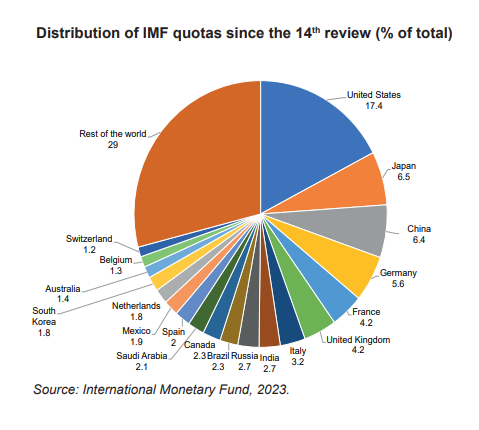IMF Governance and the 16th General Review of Quotas
The International Monetary Fund’s governance is based on a system of quotas determining the financial contribution each country is required to make to the IMF, its voting rights, and the number of special drawing rights it receives in general allocations. Today, quota distribution is a major challenge, with emerging countries calling for quota realignment that would reflect their increasing relative weighting in the global economy.
The role of the International Monetary Fund (IMF), which was originally established in 1944 to stabilise currency exchange rates and organise international monetary and financial cooperation, has gradually been expanded. It currently plays an essential role in the international financial system.
The IMF’s governance is based on a system of quotas, which are allocated to each member country. Each country’s quota determines the financial contribution it is required to make to the IMF, its voting rights, and the number of special drawing rights it receives in general allocations. Although most decisions are made by consensus, this governance structure is similar to that of a company limited by shares, with quotas representing both each country’s contribution to the IMF’s permanent resources and its relative voting rights.
Each country’s quota is based on economic variables. The most recent change to the distribution of quotas between countries was made in 2010. Despite developments in the global economy and a number of quota reviews, the IMF’s ownership structure has remained unchanged since then. The 16th review, concluded in December 2023, provides for a uniform 50% increase in each country’s quota, without changing the distribution between countries.
Against this backdrop, questions surrounding a potential reform of the Fund’s governance continue to be relevant. These questions focus on how to realign the level and distribution of quotas with the size of the global economy and the relative weight of member countries. Following the commitment made by its members in October 2023, the IMF’s Executive Board is due to put forward its proposals by June 2025, as part of the 17th General Review of Quotas, including by considering how the theoretical quota formula could be changed.
